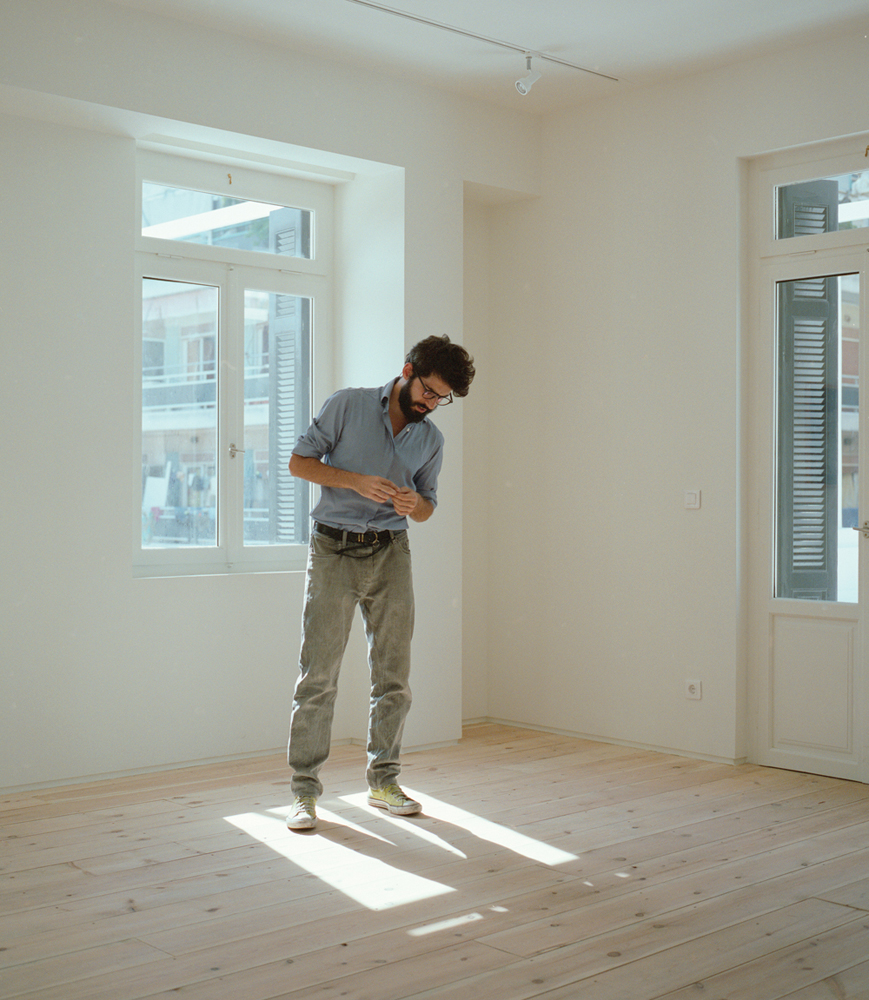
Photo: Nikolas Ventourakis
Eight years ago, Theo Michael left Thessaloniki for London. Once there, as the genuine eccentric that he is, he drinks his coffee at “Broadway Market”, he frequents the basement of “Quinto” bookstore (searching for books on Archaeology, History and Paleontology) and, naturally, he visits his favorite museums such as the John Soane Museum, the British Museum and the Pitt Rivers in Oxford. Theo Michael is mounting his first solo exhibition. It is hosted by AMP Works, a new venue established by AMP gallery. The exhibition will run until November 7, 2009. Its title is “Smoke from the Edge of the Known” and will consist of a series of works on paper-a combination of drawings, collage and printings- as well as of some cabinets containing exotic curios…
Smoke from the Edge of the Known…What exactly is burning there? Is there an ominous message of which you are the bearer? “Anyway one looks at it, this is a burning world. It’s not only burning at the edges but also in its very core. Post 9/11 hysteria, panic over global warming and the aftermath of the recent financial crisis stand out as landmarks of 21st century malaise…Conventional progress has been limited to Youtube, Facebook and Wi-Fi. Our world is more akin to destruction than to creation. Through my work, I propose the idea of ‘relapse’ as the new progress. Something not so terrible after all, if we accept that the ideas and investments of recent decades have been highly problematic.”
What is the creative process behind your work?
“I am, primarily, a collector of images and objects. Then I act as a collageur, a bricoleur and a painter. I collect any image-irrespective of provenance-that distracts my attention. It is an automated process that I’ve been practicing for the last ten years. I have a digital archive (or chaos) of 80000 untitled, unclassified images that grows constantly. This archive functions as a diary. Mostly, however, it serves as a mapping of my brain, a tool that helps me think when I look at it. That’s how my work begins. From the random and uncontrollable merging of images. They can take any form, since I’m not interested in the medium…”
“…80000 traces, remnants, documents, fossils, relics of the past.”
Is there something aesthetically pleasing to be found in relics? “Relics constitute the foundation but, at the same time, the destination of any civilization. Watching them we get a distorted, false sense of progress.”
Dystopian, retrogressive, dark and not so distant. So, is there any beauty in the beast called the Future? “The Beauty of the Beast…if the future is a beast, how could we possibly describe the present? Time is an interesting concept but it could be abolished as a dimension, the fourth dimension so to say. By that I mean: ‘I don’t own an i-phone. Do I live in the past? In Tokyo, Sony employees get to use e-paper and 3D printers. Do they live in the future? Some tribes in the Amazon don’t know of the existence of iron. Do they live in the past? Sometime soon we will be able to clone mammoths and dinosaurs. Their re-emergence, therefore, is in itself a futuristic scenario…All of the above are happening or will happen in the dimension we call space. The concept of time, thus, becomes merely a communicative and linguistic convention.”
As a “foreigner” in the greek zeitgeist, which images do you consider representative of what is termed Contemporary Greek Culture?
“ In Athens, anything I see around me can be explained through the interaction between the two principle national narratives: classical antiquity and Orthodox Christianity. These polar and conflicting opposites have created this neo-hellenic profile…I try to collect and use objects and documents of micro-historical value where this neo-hellenic character is depicted.
In one of your drawings you place the New Acropolis Museum in an indefinable, lunar landscape. Are you insinuating something? Are you risking a rather bleak prediction for the future? “There were a lot of thoughts around this particular choice. At the same time there was a difficulty in expressing them…I want for the images I create to be one step ahead of language, even in my own mind. I am very much preoccupied with the instinctive delivery of my work in an effort to escape from the legacy of reason, a legacy which I judge to be unsuccessful in the first place. I create a new image spontaneously without looking for excuses. To interpret works of art is essentially useless. It offers explanations to those who are not so sure about their taste. What actually happens is simply that if there is something that attracts us we like to look at it…And if we like it very much we might also take it with us.”
www.a-m-p.gr




